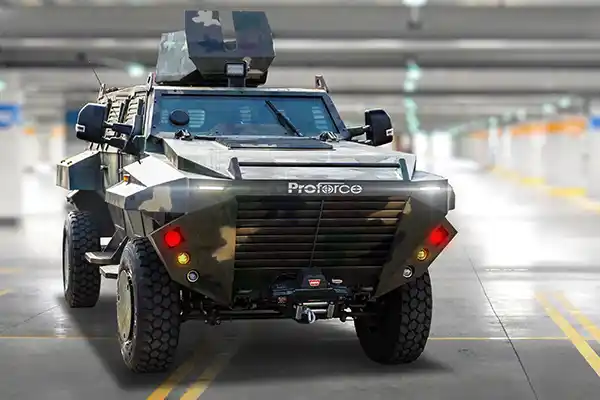
Modupe Olalere
The recent shocking statement by the U.S. President Donald Trump that the U.S. might intervene in Nigeria “guns-a-blazing” has focused global attention on Nigeria’s ongoing security crisis. About a week ago, Trump, reacting to reports of killings of Christians in Nigeria, warned that the U.S. would stop aid and may consider aggressive military action unless the Nigerian government intervened decisively. Beyond international threats and political buzzwords, however, lies a compelling story of Nigeria’s military gradually shifting from dependence on foreign weapons to a confident embrace of indigenous military technology. Though still developing, this new trajectory carries significant promise for restoring stability.
Nigeria is building a defence identity powered by homegrown innovation. Dr Bright Echefu, President of the EIB Group, argues that Nigeria has the capacity to end insurgency, banditry and kidnapping with its local technology arsenal. One standout example is the Damisa UAV, an advanced combat drone designed for surveillance, reconnaissance and precision strikes. This reflects a turning point where Nigeria’s defence outlook is tied more to its own ingenuity than to the supply chains of overseas manufacturers.
Indigenous production not only reduces procurement delays and costs but offers strategic control over sensitive military assets. As Africa’s largest economy, Nigeria is positioning itself as a regional defence hub capable of producing drones, biometric systems, armoured vehicles and small arms at prices well below global standards. Some of the country’s indigenous attack drones reportedly outperform foreign UAVs and crewed jets by more than 60 per cent while costing far less. After years of foreign procurement frustrations that allowed terrorist groups to expand, Nigeria’s ability to build and deploy equipment locally is significantly reshaping operational dynamics.
Read Also: Breaking: Trump Warns of Possible Military Action in Nigeria Over Alleged Christian Killing
Trump’s “guns-a-blazing” threat triggered strong reactions but also reinforced Nigeria’s drive toward self-reliance. Minister of Defence Badaru Abubakar reaffirmed the nation’s intention to reduce dependence on foreign production and strengthen domestic manufacturing, repairs and refurbishment of military equipment. Major-General Kevin Aligbe, head of the Nigerian Army Training and Doctrine Command, explained that the military is deepening its research and development to address emerging threats. Annual R&D conferences now explore transformative technologies and involve other agencies—from the police to the civil defence corps—to support a unified national security response. NITDA similarly insists that technology must be integral to Nigeria’s modern security strategy.
Despite the progress, Nigeria must prioritise key improvements to fully conquer insecurity. This is where military technology becomes particularly relevant. Although drones and indigenous weapons represent major advancements, Nigeria still lacks advanced artificial intelligence systems capable of predicting attacks, interpreting real-time battlefield data and enhancing operational decisions. Without integrating AI, surveillance remains mostly reactive instead of preventive.
Read Also: Read Breaking: Trump Warns of Possible Military Action in Nigeria Over Alleged Christian Killing
Cybersecurity is another critical area requiring serious attention. Terror groups increasingly use encrypted digital platforms for recruitment, financial transactions and covert communication. Nigeria’s cyber defence and offence capabilities are still developing, and inter-agency cybersecurity coordination remains inadequate. Modern conflicts demand a military that is as strong in cyberspace as it is on physical terrain.
Satellite surveillance is another pressing need. While drones offer valuable field intelligence, the absence of high-resolution satellite monitoring limits wide-area oversight. Nigeria needs satellite-supported geospatial intelligence to track movements across forests, deserts, border regions and key economic assets.
Secure communication systems also require urgent upgrading. Some military units still operate with insufficiently encrypted communication devices, exposing critical information to interception. A modern defence architecture demands secure, unified, encrypted and reliable communication between the Army, Navy, Air Force, Police, DSS and NSCDC.
Finally, Nigeria’s defence manufacturing ecosystem needs deeper development. The country may now produce drones and small arms, but it still imports essential components such as advanced sensors, night-vision systems, targeting modules and microelectronics. Achieving long-term autonomy requires investment in precision manufacturing and stronger collaboration between research institutions, local engineers and private tech innovators.
Nigeria is, however, making notable progress. The Defence Research and Development Bureau (DRDB) is partnering with private companies to create assets tailored to Nigeria’s environmental and military needs, including airboats capable of navigating the swampy terrain of the Niger Delta. A $2 billion agreement between DICON and private partners has opened new production lines for ammunition, small arms, drones and biometrics. The Nigerian Navy continues to champion the use of locally developed technologies to avoid foreign procurement delays and ensure adaptability to Nigerian conditions.
Self-developed surveillance drones have also contributed to a significant reduction in oil theft—shrinking losses from approximately 100,000 barrels per day to 5,000 and enabling national output to rise to 1.75 million barrels daily. This illustrates how technology-driven enforcement can protect vital national resources.
Through a combination of homegrown innovation, expanding digital infrastructure and stronger investment in modern military technology, Nigeria is steadily developing a defence force capable of autonomy, precision and rapid response. Trump’s warning may have drawn global attention, but Nigeria’s evolving military capabilities reflect a deeper story of resilience, creativity and emerging strategic confidence. Strengthening artificial intelligence, cybersecurity, satellite surveillance, secure communication systems and defence manufacturing—key pillars of modern military technology—will determine how quickly Nigeria can overcome insecurity and build a more stable future.
